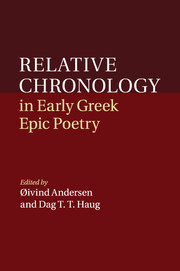Book contents
- Frontmatter
- Contents
- Notes on contributors
- Preface
- Abbreviations
- Introduction
- Chapter 1 πρῶτόν τε καὶ ὕστατον αἰὲν ἀείδειν
- Chapter 2 Relative chronology and an ‘Aeolic phase’ of epic
- Chapter 3 The other view
- Chapter 4 Late features in the speeches of the Iliad
- Chapter 5 Tmesis in the epic tradition
- Chapter 6 The Doloneia revisited
- Chapter 7 Odyssean stratigraphy
- Chapter 8 Older heroes and earlier poems
- Chapter 9 The Catalogue of Women within the Greek epic tradition
- Chapter 10 Intertextuality without text in early Greek epic
- Chapter 11 Perspectives on neoanalysis from the archaic hymns to Demeter
- Chapter 12 The relative chronology of the Homeric Catalogue of Ships and of the lists of heroes and cities within the Catalogue
- Chapter 13 Towards a chronology of early Greek epic
- Bibliography
- General index
- Index locorum
- References
Chapter 1 - πρῶτόν τε καὶ ὕστατον αἰὲν ἀείδειν
Relative chronology and the literary history of the early Greek epos
Published online by Cambridge University Press: 05 January 2012
- Frontmatter
- Contents
- Notes on contributors
- Preface
- Abbreviations
- Introduction
- Chapter 1 πρῶτόν τε καὶ ὕστατον αἰὲν ἀείδειν
- Chapter 2 Relative chronology and an ‘Aeolic phase’ of epic
- Chapter 3 The other view
- Chapter 4 Late features in the speeches of the Iliad
- Chapter 5 Tmesis in the epic tradition
- Chapter 6 The Doloneia revisited
- Chapter 7 Odyssean stratigraphy
- Chapter 8 Older heroes and earlier poems
- Chapter 9 The Catalogue of Women within the Greek epic tradition
- Chapter 10 Intertextuality without text in early Greek epic
- Chapter 11 Perspectives on neoanalysis from the archaic hymns to Demeter
- Chapter 12 The relative chronology of the Homeric Catalogue of Ships and of the lists of heroes and cities within the Catalogue
- Chapter 13 Towards a chronology of early Greek epic
- Bibliography
- General index
- Index locorum
- References
Summary
The relative chronology of early Greek epic poetry is an essential question for anyone who wishes to understand the literature, society, history, religion and mythology of early Hellas. Yet the dating, both relative and absolute, of the poems themselves is a field where chaos and confusion reign. With the exception of Martin West, who famously stated that Hesiod's Theogony ‘may well be the oldest Greek poem we have’ (1966: 46), until about 1980 most scholars believed that the Homeric poems were composed later in the eighth century bc, and the Hesiodic poems a generation or two later. The belief that the poems of Homer are older than Hesiod's concurred with the views of Eratosthenes and Aristarchus, who marshalled much evidence, principally from geography, that Hesiod was later than Homer, since Hesiod knew of more remote places in the Mediterranean and named them more accurately, e.g. the Nile. Aristarchus argued this in a lost monograph entitled Περὶ ἡλικίας Ἡσιόδου, ‘On the age of Hesiod’. Now, however, many scholars who have made important contributions to our understanding of different aspects of the early Greek epic tradition either profess uncertainty about Homer's date or argue for dates in the seventh or even the sixth centuries bc.
Thus I broach this topic with some trepidation. This is not because I do not know what I believe about it; indeed, that belief has been further strengthened over time. In 1982 I published my doctoral thesis under the title Homer, Hesiod and the Hymns: Diachronic Development in Epic Diction. This title reflects what I believe that I proved in that book, namely that the poems of Hesiod post-date the Homeric epics, and that the long Homeric Hymns are mostly later still. The sole exception to this is the Hymn to Aphrodite, where I then accepted arguments from the detection of exemplum and imitatio, which I felt dated the poem after the Theogony (Janko 1982: 25, 225–8, 200 fig. 4), rather than my linguistic methodology, which strongly suggested a date soon after that of the Iliad (Janko 1982: 151–80, 74 fig. 3). I now think I ought to have had more faith in my own method, and prefer to date the Hymn to Aphrodite to Homer's time, with its oddities explained by the influence of the original Aeolic tradition on which it also drew. My primary focus throughout was on the relative chronology of the poems in the corpus, and not on their absolute date, although I did offer some very tentative suggestions about absolute dates.
- Type
- Chapter
- Information
- Relative Chronology in Early Greek Epic Poetry , pp. 20 - 43Publisher: Cambridge University PressPrint publication year: 2011
References
- 19
- Cited by



